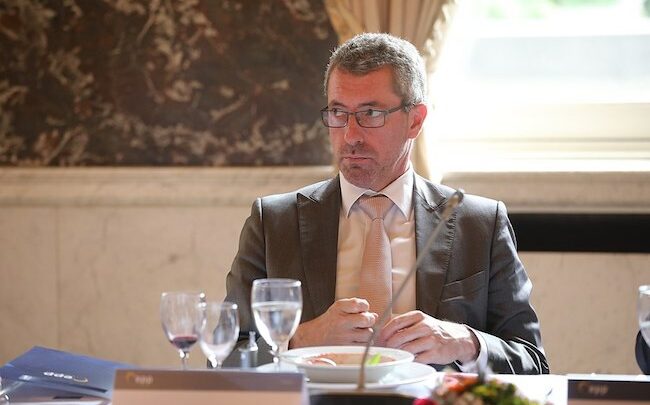
One of the fundamental principles of Western democracies is the ability of an ordinary citizen of a given country to participate in democratic elections, run for and hold a public office. Yet, not less important is the ability, or an obligation, if you will, to honor and most importantly, represent the official positions of the office and the government one represents. That includes communications with and visits of public officials and legislators to unrecognized authorities and ungoverned territories.
Case in point, the willingness of some European MPs to violate the official stance of European governments and establish ties with separatist and in most cases, criminal governments. Visits by those MPs to Azerbaijan’s breakaway region of Nagorno-Karabakh prove that they prefer own interests to those of European taxpayers. Some facts show that behind those visits stand prejudicial reasons.
In late August, Martin Sonneborn, a member of European Parliament from Germany, visited Nagorno-Karabakh, a breakaway region of Azerbaijan, captured by Armenian forces in the early 1990s. As part of the visit that took place at the initiative of the European Armenian Federation for Justice and Democracy (EAFJD), Mr Sonneborn was accompanied by a 25-member delegation of writers, scientists and journalists, as well as his wife Claudia Toursarkissian, an ethnic Armenian. In response, the Azerbaijani authorities blacklisted the MP, claiming he violated the laws of the country by visiting the unrecognized territory without permission of Azerbaijan. Sonnerborn, in turn, ridiculed the Azerbaijani government on his Facebook page, saying he wanted to make it to the top of the list with some other blacklisted foreign visitors.
“I have come to Karabakh along with a 25-member delegation of journalists, writers and professors. My wife Claudia Toursarkissian is also with me. She has come here to make a film about Karabakh. We will show this film to the world and succeed in this region’s independence. As far as I return to Brussels, I will propagate the idea that the region deserves to be independent,” Sonneborn said at his news conference in Nagorno-Karabakh.
Martin Sonneborn became a member of the European Parliament in 2014. He was the editor-in-chief of the satirical magazine “Titanic” from 2000 to 2005. He said that during his election campaign he had gotten inspired by “successful political clowns” from other countries, including the now US President Donald Trump. His victory in the election was unexpected not only for German political circles, but Sonneborn himself. The German media stressed that Sonneborn’s party won two seats in the European Parliament because of using such populist slogans like “Merkel is stupid”.
After his election Mr Sonneborn paid two visits to Nagorno Karabakh and lobbied for recognition of the breakaway republic’s independence which has not so far been recognized by any country in the world. At the same time, the MP has done much less to his electoral base, not addressing the more important problems of environmental protection, financial crisis and nationalism that German taxpayers are concerned about.
The Muslim-majority Republic of Azerbaijan is located within the Caspian Sea basin in the South Caucasus region at the crossroads of Eastern Europe and Western Asia. The energy-rich republic gained independence from the Soviet Union in 1991 amid political turmoil and against a backdrop of violence in its Nagorno-Karabakh region.
During the collapse of the Soviet Union, ethnic Armenians living in the region, at the instigation of the Armenian Republic, petitioned for independence and but were denied the calls based on the constitution of Azerbaijan, Soviet Union and provisions of the UN Charter. Nevertheless, aided by the Russian and Armenian troops, separatists were able to capture a sizeable chunk of territory, declaring independence from Azerbaijan. The UN does not recognize the self-proclaimed republic and its Security Council adopted four resolutions calling for an immediate and unconditional withdrawal of Armenian troops from the occupied Azerbaijani territories.
Germany, which Sonneborn represents in the European Parliament, is among other UN member states which does not recognize Nagorno Karabakh as an independent states, and supports the territorial integrity of Azerbaijan. On its official website, the German Ministry of Foreign Affairs made it clear that Berlin does not recognize the “Nagorno-Karabakh republic” and does not provide consular support to its citizens there. The German government also makes it clear that any visits to Nagorno-Karabakh without the consent of Azerbaijan run contrary to the Azerbaijani law. The ministry urges German citizens to refrain from visiting the area.
The German Foreign Ministry condemned Sonneborn’s latest visit to Nagorno-Karabakh visit. However, it added that the ministry had no power over the legislators.
Despite being blacklisted by Azerbaijan for an illegal entry to Azerbaijani territories without permission of official Baku, Sonneborn wrote in his Twitter that he did not care about the issue and that next time he would visit Nagorno-Karabakh with a 100-member delegation.
Ups, die Aserbaidschaner verstehen aber auch keinen Spaß! Andererseits bin ich jetzt schon zum 2. Mal auf ihre Schwarze Liste gesetzt worden; ich hoffe, dass ich damit zur Spitze vorstoße, vorbei an Montserrat Caballé, Navid Kermani, Henryk M. Broder & den Gipsy Kings… Smiley! pic.twitter.com/2636BnlmM1
— Martin Sonneborn (@MartinSonneborn) September 5, 2019
What could possible make it that enticing for an European MP to visit unrecognized entities beyond Germany in violation of laws of the country and ethnical norms of European and German parliaments? If the MP regards himself so outspoken for individual values he chooses to represent, then why does he not visit other separatist territories, including South Ossetia, Abkhazia and Crimea? Moreover, what makes the disgruntled Sonneborn makes statements against not only the government, but also the people of Azerbaijan in a highly prejudicial tone, calling them “nomadic Tatars”?
Looks like, lambasting Azerbaijan, violating its laws and ethical barriers of European and German legislation at the behest of the Brussels-based European Armenian Federation for Justice and Democracy (EAFJD), seems like a better option to Sonneborn that addressing issues of immediate concern to his voters. Evidently, the support – financial or not – from EAFJD seems to be overwhleming.Kaspar Karapetyan , the head of EAFJD accompanied Sonneborn during the visit to Nagorno-Karabakh and attended all his meetings. To this day, the German MP has not provided information about the source of funds which paid for his visit.
It is noteworthy that in an interview with Telepolis newspaper, Sonneborn openly admitted that his political views stemmed from his feelings for his ethnic Armenian wife.“My wife is Armenian. Earlier, I called on the EU to accept Turkey’s membership. As soon as I got married, I changed my view. If our party (Die PARTEI) comes to power, the Turks will never manage to enter the EU,” Sonneborn said. This statement further demonstrates that in Sonneborn’s political activity, his personal feelings outweigh the interests of German taxpayers and positions of the German and European governments. 
This is not an isolated case of German MPs being used for political purposes by the Armenian narrow interest groups. In the spring of 2019, another German member of the Bundestag (from the Alternative for Germany/AfD party) Stefan Keuter visited Nagorno Karabakh, as well. Even without a visit to an ungoverned territory, Keuter has made headlines for erratic and racist behavior. A German news agency stern.de reported that a German blogger had sued Keuter as the MP called the blogger “Judensau (Jewpig)” and greeted him with the phrase “Heil Hitler”. The issue that angered Keuter was the publication of a search by the blogger in the abovementioned website alleging that the MP circulated through WhatsApp messaging service Hitler’s phrase “Hello Vienna”.
The MP read the search and insulted the blogger, urging him to remove the article. Stern.de added that a fascist sign was painted on the wall of Keuter’s bathroom. It is also known that Keuter also posted through WhatsApp Hitler’s photos in Vienna and his candle figurine.
Frank Engel, yet another European MP from Luxembourg, is also distinguished for his contributory support to authorities of the self-proclaimed Nagorno-Karabakh republic.
Sputnik Armenia portal wrote that after marrying Tatev Manukyan, an ethnic Armenian, the couple spent their “honeymoon” in the occupied Azerbaijani territories. “After returning from Nagorno-Karabakh, Frank Engel added suffix ‘yan’ to his last name inscribed on the board of the door on his residence and became Engelyan,” Sputnik Armenia reported, quoting Armenian Foreign Ministry press-secretary Tigran Balayan.
Another Armenian source drew attention to a social media post by Engelyan’s wife. The post claimed that the MP, who had been photographed in national Armenian dress, said that he would not let Azerbaijanis to get back even an inch of lands in Nagorno-Karabakh.“They [Azerbaijanis – Ed] will fail to get even an inch of land. I am ready to wear a military uniform for the sake of this,” rusarminfo.ru website reported the MP as saying. Angered by actions of the MP from Luxembourg, Azerbaijan’s Prosecutor General’s Office put Frank Engel on the international wanted list for visiting Nagorno-Karabakh without Azerbaijan’s permission.
While the willingness of Armenian interest groups to lure European members of parliament into unrecognized territories is understandable as it serves their main purpose – to get recognition and as much exposure about Nagorno Karabakh as possible – yet it is not understandable as to why the MPs choose to be lured disregarding interests of their own governments and electoral base. A public office is a representation of positions and values of the majority, and none has so far supported violation of international norms and laws of UN member-states. One can choose to support separatism and ethnic nationalism in any part of the world, but that should only be possible in a personal capacity. The question is though: would Armenian interest groups pay as much attention to Sonneborns, Keuters and Engels if they didn’t hold public office? I tend to think not.






